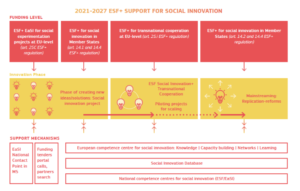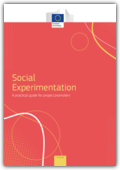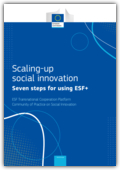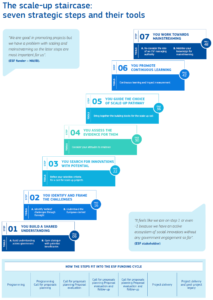The work to promote equality, inclusion and non-discrimination of the Roma population is one that could benefit from social innovation and social experimentation.
In a rapidly changing world, where new challenges (such as the green and digital transition, Covid-19, migration issues, etc.) emerge in a constant manner and are transforming and challenging the different areas, social innovations (which are social in their ends and in their means) are a must to be able to respond to these new realities from a social perspective.
Against this background, the European Commission has published two complementary practical guides aimed to promote a better understanding and use of social innovation and to walk interested parties through the whole process: from identifying social challenges to developing innovative solutions, to demonstrating their potential and finally helping to roll out the most convincing models in a larger scale. These guides are linked to the work done within the EU to support mutual learning and cooperation between social innovation stakeholders across Member States.
The work to promote equality, inclusion and non-discrimination of the Roma population is one that could benefit from social innovation and social experimentation; however, it seems that the potential of this option is not widely perceived and used. For example, in the 2014-2020 programming period, among the 14 reports on projects supported by the Programme for Employment and Social Innovation (EaSI), merely 6 innovation projects dealing with Roma people can be found (and many of them include Roma people among a larger list of target groups, such as migrants, refugees and asylum seekers, young people, not being in fact innovation projects specifically addressed to Roma).
Aware of this, the use of social innovation and transnational cooperation for Roma inclusion within the 2021-2027 ESF+ was one of the topics addressed at the June EURoma Management Committee meeting
Social innovation and experimentation in the 2014-2020 and 2021-2027 programming periods 
During the 2014-2020 programming period, the European Union Programme for Employment and Social Innovation (EaSI) provided financial support to 35 projects to test social and labour market policy innovations before being implemented at a larger scale, as well as to build up the main actors’ capacity to design and implement social policy initiatives. Some great achievements have been acknowledged but more can be done to improve their impact on the policy field and their upscaling in order to benefit more people.
The social experimentation approach- combining social policy experimentation, mainstreaming and upscaling- remains valid for the 2021-2027 period. It can be further improved through the enhanced support to social innovation provided by the European Social Fund Plus (ESF+), which provides an increased support to both social innovation and social experimentation. Social innovation and social experimentation will be supported in three complementary ways:
- Under shared management (with Member States and regions), through the “ESF+ strand”
- Under direct management by the European Commission, through the “EaSI strand – Employment and Social Innovation
- Under indirect management
 Guide “Social experimentations: A practical guide for project promoters”
Guide “Social experimentations: A practical guide for project promoters”
The Guide “Social experimentations: A practical guide for project promoters” is aimed to support stakeholders in building transnational projects under the ESF+ EaSI strand. In this sense, it is useful for EaSI project promoters preparing a social experimentation proposal in the 2021-2027 programming period but also those responding to ESF+ national and regional calls on social innovation under shared management.
It could be also interesting for policymakers and funding organisations at all levels (EU, national, regional and local), in particular ESF+ Managing Authorities. This guide shows the value of social experimentation and the information provided (including the results of already successfully tested social experimentations) could be useful as a reference or to design and launch new specific calls to test innovative solutions addressing policy needs, which may help avoid some failures and associated costs. This should improve the design of policies, programmes, calls and funding mechanisms to support social innovations and social experimentations.
 Toolkit “Scaling up Social Innovations: Seven steps for using ESF+”
Toolkit “Scaling up Social Innovations: Seven steps for using ESF+” 
The toolkit “Scaling up Social Innovations: Seven steps for using ESF+” is primarily meant to serve ESF+ Managing Authorities and Intermediate Bodies, as well as meriting the attention of stakeholders more widely.
It recommends seven strategic steps to follow in support of scaling-up of social innovations. The seven steps are inspired by a range of European and other research projects, practical experiences, EU policy acquis, and dialogue about research, practice and policy.
The toolkit was developed for and with the Community of Practice on Social Innovation, under the ESF Transnational Cooperation Platform. The aim is to help Member States to make strategic use of their national ESF resources for scaling-up social innovation.

